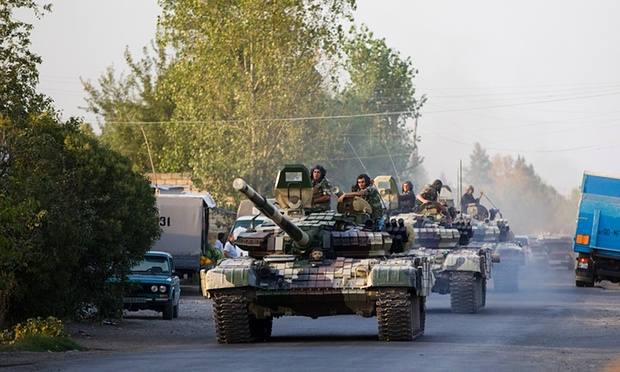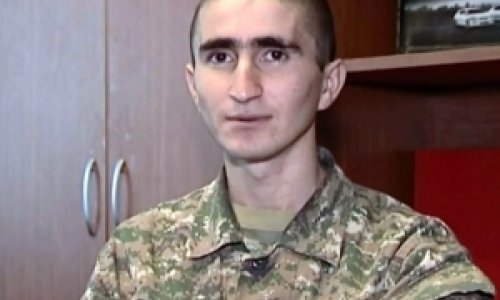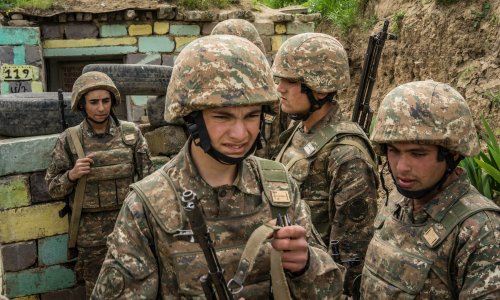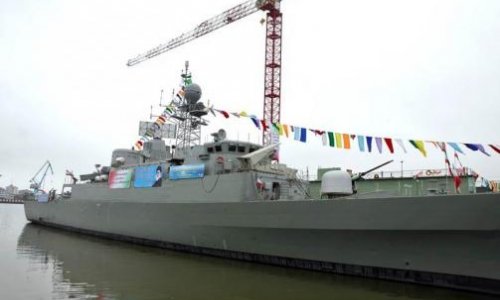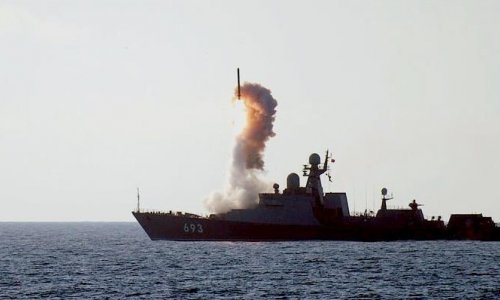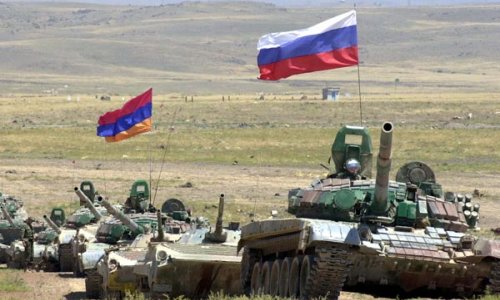The standoff between Armenia and Azerbaijan over the breakaway territory of Nagorno-Karabakh appears to be entering a new phase. Both sides have ramped up military exercises in recent months and attended frequent meetings with Russian officials, fostering speculation in local media that a settlement may be forthcoming. Indeed, the countries' foreign ministers plan to meet on the sidelines of the U.N. General Assembly summit in New York on Sept. 24-25.
But this is not necessarily a watershed moment. A solution to the conflict would require a reworking of the web of political alliances and relationships that span the Caucasus region, which could be a disruptive process. Still, ongoing tensions between Russia and the West over Ukraine have dramatically changed the political situation in the region since 2014; Russia, Armenia and Azerbaijan might be poised to make changes in Nagorno-Karabakh.
Analysis
The trajectory of the Nagorno-Karabakh conflict has always depended on three players: Armenia, Azerbaijan and Russia. Each has a different perspective. Armenia was the victor in the initial 1988-1994 territorial conflict, defeating Azerbaijan and occupying the area. As a result, Yerevan wants to maintain de facto control of Nagorno-Karabakh and seven surrounding regions. Azerbaijan, of course, wants to reverse this and regain control of Nagorno-Karabakh by diplomatic or even military means. Russia does not have a direct interest in the outcome of the conflict and thus has been able to manipulate it to advance its own interests in both Armenia and Azerbaijan, as well as in the broader Caucasus region.
Until 2014, Moscow's official position was neutral, calling for negotiations between the two sides. Informally, however, Russia backed Armenia, which had long been a loyal member of Russian political and security blocs in the former Soviet space and allowed Russia to station 5,000 troops on its soil. Azerbaijan, by contrast, had chosen not to align itself with Russia. Instead, it diversified its foreign policy relationships, growing close with Turkey and the West to balance out Russian influence. Azerbaijan used its energy resources to fuel its economy and build up its military. Baku's defense expenditures rose to the point that they eclipsed Armenia's entire national budget. From a policy perspective, Azerbaijan made reclaiming Nagorno-Karabakh an official priority but balked at taking serious action because of Russia's position as Armenia's military patron.
This status quo changed in early 2014 with Kiev's EuroMaidan uprising and the ensuing standoff between Russia and the West. Russia was suddenly a less reliable patron for Armenia: the Ukraine conflict took up much of Russia's security bandwidth, and Western sanctions hurt the domestic economy. At the same time, Azerbaijan became more valuable to the West because Baku could offer Europe an energy supply alternative to Russia. Since 2014, as a result, Azerbaijan's military has been much more assertive on the line of contact in Nagorno-Karabakh. Azerbaijani raids into the disputed territory have increased significantly, and instances such as the shooting down of an Armenian helicopter by Azerbaijani forces have not provoked reciprocal actions out of Armenia or meaningful rebukes from Russia. The strength of Azerbaijan's position within the Nagorno-Karabakh conflict has improved, while that of Armenia and Russia has weakened.
These ground changes have been accompanied by an unprecedented level of diplomatic activity in recent months. Russian and Azerbaijani political and military officials have met several times, with follow-up visits between Russian and Armenian officials. Reports also emerged that Russia is planning to set up a military radar installation in Azerbaijan in 2017, although Moscow has denied these claims. These coincided with media in Armenia and Azerbaijan reporting that serious talks were in the works. These unconfirmed reports suggest that parties are negotiating an arrangement that will soon change the status quo.
Weighing the Options
Several scenarios have been floated as to what such a settlement would look like. One would involve the full withdrawal of Armenian forces from the seven regions adjacent to Nagorno-Karabakh but not the territory of Nagorno-Karabakh itself. In this scenario, Russian peacekeepers would replace Armenian troops. Alternatively, the Armenian troops could be replaced by an international peacekeeping force under Russian control. Armenia would retain access to Nagorno-Karabakh and the Lachin corridor, but the Armenians living in the adjacent districts would be resettled to Nagorno-Karabakh or Armenia proper. Armenia would receive economic and security incentives for such a withdrawal, including greater financial and military assistance from Russia and a potential opening of its borders to facilitate trade with other regional players such as Turkey and Iran.
Though the possibility of some variation on this scenario has increased with the change in the external dynamics of the region, numerous obstacles stand in the way. Armenia opposes this outcome because it wants to maintain the status quo in Nagorno-Karabakh. Domestically, compromise over Nagorno-Karabakh is extremely sensitive. The last Armenian president to try to negotiate an end to the conflict was Levon Ter-Petrosyan, who was ousted in 1998. Current Armenian President Serzh Sarkisian is a native of Nagorno-Karabakh, as is his predecessor Robert Kocharyan, who perhaps not coincidentally has reappeared on the political scene just as talk of a settlement began. The Armenian government is already under a great deal of strain because of a weakening economy, rising utility costs and inflation. Making concessions on Nagorno-Karabakh now could push the current administration out of power. Yerevan would be hesitant to strike such a deal unless it had no other choice or it gained enough assurances to sell it to the public.
Russia has its own considerations. The current balance of power in the Caucasus suits Russia: It keeps Armenia isolated and dependent on Russia, while Azerbaijan and Georgia have been limited in their room for maneuver. However, Georgia has been attempting to build closer ties with the European Union and NATO. The West has also been courting Azerbaijan to participate in Southern Corridor energy projects such as the Trans-Caspian pipeline. Russia now realizes that the long-standing balance of power may not hold for long. This could explain Moscow's outreach to Azerbaijan and what appears to be serious negotiations over changing the status quo in the territorial dispute. Russia could be calculating that, if a change to the conflict is inevitable, it wants to play a major role in the negotiations. It may be no coincidence then that Azerbaijan has become more resistant to the Organization for Security and Co-operation in Europe mediation process, which involves the United States. Instead, Baku has been more closely involved in bilateral talks with Russia.
Of course, any resolution would impact regional players Turkey and Iran. Turkey tried to negotiate a normalization process with Armenia in 2009, which angered Azerbaijan when it did not include a settlement of Nagorno-Karabakh as a precondition. This undermined Ankara's relationship with Baku. Eventually, negotiations with Yerevan broke down, and both Armenia and Azerbaijan moved closer to Russia. In the event that Russia would be able to convince Armenia to compromise on the Nagorno-Karabakh issue, this would involve provisions for Armenia to open its border with Turkey and increase trade with Iran in a bid to end Yerevan's regional economic isolation. Such a move would be risky for Russia because it would invite Turkish and even Iranian influence into a region strongly dominated by Moscow. The risk is, however, that doing nothing will erode Russia's position regardless.
Another potential scenario would see Azerbaijan intensify the conflict on the ground to advance the negotiating process. The current level of activity along the line of contact has not yet compelled Armenia to shift its position, and Azerbaijan could decide to scale up the conflict in order to pressure Yerevan into giving greater concessions on the political front. However, military escalation would have to come with an implicit understanding between Baku and Moscow. Otherwise, Azerbaijan risks Russian involvement in the conflict. Moscow has recently displayed more flexibility toward Azerbaijani military actions on the line of contact, but Russia would be careful not to be seen as completely abandoning Armenia. Russia's main objective would be to balance between the two sides and play the role of primary mediator. This is made easier by Azerbaijan's rift with the West over human rights issues. An uptick in the conflict may be a tolerable, though complicated, risk for Moscow if it is enough to force Armenia into a negotiation and preserve Russia's influential role in both countries.
The negotiation process, if it is in fact occurring, is still in its early stages; the talks may break down and return both sides to the status quo. But there has been a lot of movement on both the diplomatic and security fronts, and a growing number of military exercises and skirmishes along the line of contact in Nagorno-Karabakh could be interpreted as an intensification of the negotiation process rather than a sign of a looming conflict. There are still several political obstacles to resolving the long-simmering standoff, but recent indications are that some meaningful changes could be in store.
(Stratfor)
www.ann.az
Follow us !

